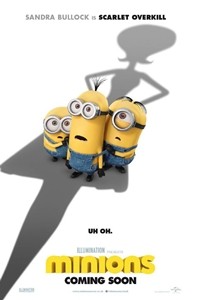 Minions
Minions
Directors: Kyle Balda and Pierre Coffin
Cast: Chris Renaud, Pierre Coffin, Sandra Bullock and Jon Hamm
Rated: PG
Run Time: 91 minutes
Genre: Animation, Comedy, Family
Opens: July 10, 2015
by Michael Clawson of Terminal Volume
The Minions might be my guilty pleasure. They are stupid, unredeeming, relentlessly pointless characters who were created to cute-up the mostly despicable Despicable Me franchise. Here they star in an awful prequel filled with awful characters, and all I can do is smile with delight. Because Minions! These little pet characters in their blue overalls and yellow pill-like bodies, their unintelligible gibberish of a spoken language that sounds like a mix-up at the Rosetta Stone factory, their squeaky optimism shrouded in child-like innocence … they are very hard creatures to not like, although Minions does its best to test your limits. The film is an origin story for the lovable henchmen, who previously served (and stole the show from) supervillain Gru in two other films. In the opening credits, we learn that the Minions are their own species, one that evolved in the shadows of greater beasts from the time they were single-celled protozoa through the Jurassic period and right into the age of man. In the opening sequence, it’s revealed they were henchmen for a Tyrannosaurus Rex, a caveman, Dracula and Napoleon — and each time they failed miserably. The Minions end up in a snow cave, where life is not the same without a master to serve in his evil bidding. Kevin, Stuart and Bob volunteer to leave the cave to search for their new boss. They eventually land in New York City and it’s 1968, a great time for crooks, there was even one in the White House. Through casual mistakes and happy coincidences — the universe shines bright on these dopey characters — the Minion trio learn of Villain-Con, a convention for nefarious evildoers. Certainly, they think, they can find a new boss to serve there.
Villain-Con could have been its own movie entirely, with countless booths of crime gadgets and criminal empires, but the film spends two short sequences there until it bounces away with Scarlett Overkill (Sandra Bullock), who enlists the Minions to steal the Queen of England’s royal crown. This is where Minions falls apart.
Kevin, Stuart and Bob — and Bob’s tiny stuffed animal Tim — break into the Tower of London, hypnotize three stripping Beefeaters, tear through London on a stagecoach and a grappling suit, and eventually crash land at the Sword in the Stone, which sets the rest of the film into motion in an unpredictable and mostly blah sorta way. Minions is not high art here, I know that. But it literally could have went anywhere it wanted. The African Serengeti, time traveling, Venus, an office park in Toledo .. anywhere. It begins in primordial soup and quickly features dinosaurs, vampires and a caveman with a primitive flyswatter. How and why this silly film decided to go with this route, of all the routes out there, is a question that will puzzle me. It’s just not interesting, mostly because it requires us to believe that Scarlet Overkill would aim her wrath at three characters that did exactly what she asks. She tells them to steal the crown, and they do, and then she goes all supervillain on her supervillain henchmen for no other reason than the plot demands it. Gru wasn’t written much better, but at least he had more of an arc.
One of the problems here is clearly Bullock, who is not a voice actor and who was added to the cast list because movie executives still think little kids care about celebrity voices. Kids don’t, and guess what, most adults don’t either. I would much rather listen to some unknown professional voice actor do this than someone whose name looks good on a poster. Bullock phones it in, and Minions devotes so much of the second half to her that it’s aggravating. I just want more Minions. How hard is that? Apparently very hard.
There are still some choice gags here, including brief scenes involving a faked moon landing, The Beatles on Abbey Road, and a news reporter who calls the Minions “bald, jaundiced children.” A stop-motion sequence, or a scene made to look like stop motion animation, is a fun addition. The soundtrack is simply perfect, with hits by the Turtles, the Rolling Stones, The Doors, The Beatles and other great era-appropriate bands. I appreciate how the title characters aren’t really that evil, and are genuinely kind and compassionate little creatures — if only they could find fulfillment in some other career.
I love these little characters. If only they had a better movie to call their own.

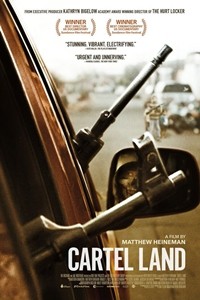 Cartel Land
Cartel Land
 Self/less
Self/less
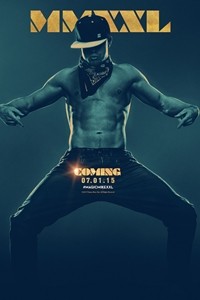 Magic Mike XXL
Magic Mike XXL
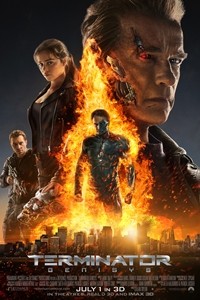 Terminator Genisys
Terminator Genisys
 The Overnight
The Overnight
 Escobar: Paradise Lost
Escobar: Paradise Lost
 Ted 2
Ted 2
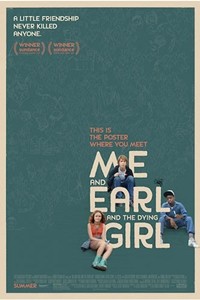 Me and Earl and The Dying Girl
Me and Earl and The Dying Girl
 Inside Out
Inside Out
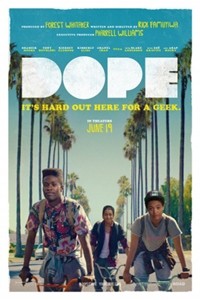 Dope
Dope
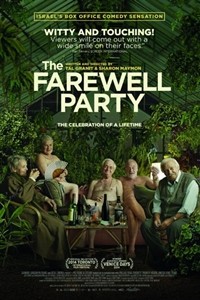 The Farewell Party
The Farewell Party
 Jurassic World
Jurassic World
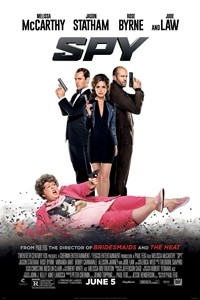 Spy
Spy








